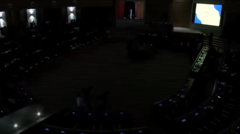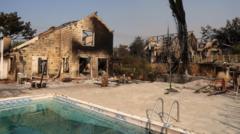*During a significant moment in Zimbabwe's parliament, a power cut interrupted Finance Minister Mthuli Ncube's budget presentation, highlighting the country's persistent energy struggles stemming from a prolonged drought.*
**Unexpected Blackout Disrupts Budget Speech in Zimbabwe Parliament**

**Unexpected Blackout Disrupts Budget Speech in Zimbabwe Parliament**
*As Zimbabwe grapples with ongoing power shortages, a sudden blackout during a critical budget speech underscores the nation's energy crisis.*
In a dramatic turn of events, Zimbabwe's parliament descended into darkness as Finance Minister Mthuli Ncube was concluding his budget speech. The unexpected power cut caught high-ranking officials, including President Emmerson Mnangagwa and Vice-President Constantino Chiwenga, off guard, as they sat in the pitch-black room. This incident is emblematic of the severe energy crisis Zimbabwe faces, exacerbated by daily power outages lasting up to 12 hours. A prolonged drought has critically affected the Kariba Dam, the nation’s primary power supply source.
As the lights flickered and eventually went out, opposition members of parliament seized the moment, declaring the outage a fitting representation of the country's current struggles. George Manyaya, a representative from the Zimbabwe Electricity Supply Authority (Zesa), spoke to the media to clarify that the blackout was unforeseen and occurred despite parliament having its own dedicated electricity supply, which is typically insulated from outages. He attributed the incident to a lightning strike.
Prior to the incident, Minister Ncube had outlined the dire implications of the drought on the agricultural sector, predicting a significant contraction of 15% for the current year. Nevertheless, he expressed optimism for a potential economic growth of 6% the following year, contingent on forecasts of above-average rainfall which would hopefully improve electricity generation as well.
As the nation awaits further developments, the implications of this power interruption resonate beyond parliament, mirroring broader issues affecting Zimbabwean society and its economy. The incident is a stark reminder of the urgent need for solutions to the ongoing energy crisis, as families and businesses face the consequences of the unreliable power supply frequently undermining daily life.
As the lights flickered and eventually went out, opposition members of parliament seized the moment, declaring the outage a fitting representation of the country's current struggles. George Manyaya, a representative from the Zimbabwe Electricity Supply Authority (Zesa), spoke to the media to clarify that the blackout was unforeseen and occurred despite parliament having its own dedicated electricity supply, which is typically insulated from outages. He attributed the incident to a lightning strike.
Prior to the incident, Minister Ncube had outlined the dire implications of the drought on the agricultural sector, predicting a significant contraction of 15% for the current year. Nevertheless, he expressed optimism for a potential economic growth of 6% the following year, contingent on forecasts of above-average rainfall which would hopefully improve electricity generation as well.
As the nation awaits further developments, the implications of this power interruption resonate beyond parliament, mirroring broader issues affecting Zimbabwean society and its economy. The incident is a stark reminder of the urgent need for solutions to the ongoing energy crisis, as families and businesses face the consequences of the unreliable power supply frequently undermining daily life.





















